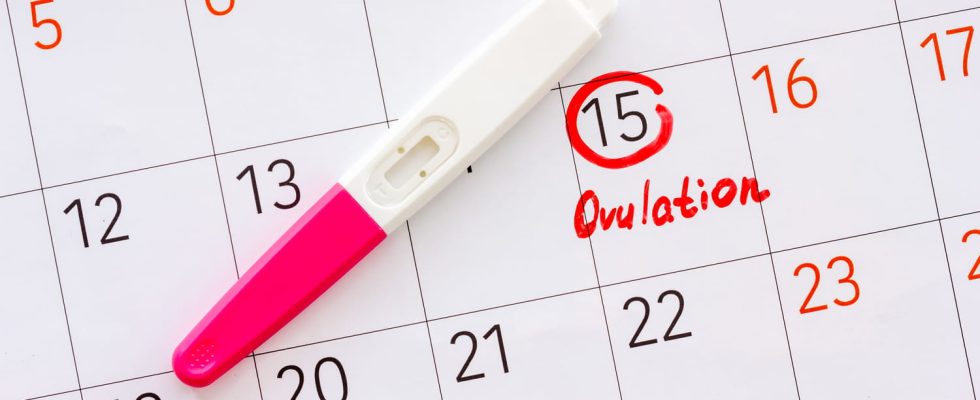Ovulation usually occurs 2 weeks before the start of menstruation, in women who have regular cycles. How do I know if I am ovulating? What are the symptoms ?
Ovulation is the basis of reproduction. It aims to release an oocyte into the fallopian tubes. It is then ready to be fertilized by a sperm and give birth to an embryo. “Ovulation usually occursnt 14 days before the start of the next period, explains Brigitte Letombe, medical gynecologist and obstetrician in Lille. There are certain warning signs but every woman has different signs.” If you want to get pregnant, and you have difficulty recognizing these signs of ovulation, you can also use ovulation tests, sold in pharmacies and carried out at home. They are very reliable.
What are the symptoms of normal ovulation?
Some of the signs may indicate ovulation, although every woman is different and must learn to recognize her own signs. Among the most common are:
- a kind of breast tenderness,
- a feeling of libido stronger in some
- especially heavier vaginal dischargeor even slightly sticky and transparent vaginal secretions “whose consistency can be reminiscent of egg white” details the gynecologist. It is this vaginal mucus that allows sperm to reach the uterus.
- “There may also be a slight increase in temperaturebut a day after ovulation, that’s why some techniques are based on that.” adds the doctor. To be detected, temperature measurement must be carried out over several months, always under the same conditions.
- “There are women who feel a abdominal pain, in the ovary, during ovulation. They can even say which side they ovulated, but that’s far from the majority.”
- More rarely: bloating even a slight weight gain associated with a phenomenon of water retention.
This recognition of the signs of ovulation is not easy and the absence of symptoms does not mean that there is no ovulation and that unprotected sex will not result in pregnancy.
What are the symptoms of poor ovulation?
We speak of poor ovulation when there is an irregular ovulation abnormality, which is also called dysovulation. “Ovulation occurs, but not every cycle, explains Doctor Letombe. He may not ovulate for two or three months. We realize this because there is no sign of ovulation, so we must do a gynecological check-up if it persists.” These problems can have several origins. : psychological shock, extreme weight loss, or poor ovarian functionwhich is unable to ovulate or produce in the right balance the hormones necessary at the very early stages of embryo development, even before the missed period. “You must also pay attention to the periods: in the case of dysovulation, it may happen that there is bleeding without ovulation, which is why a gynecological check-up is necessary as soon as there is any doubt. ”
What are the signs of late ovulation?
“Late ovulation may be a sign of poor quality ovulation.” Indeed, irregular cycles are generally a bad sign (but not always, it’s case by case). “We can anticipate late ovulation with our temperature curve or a urinary ovulation test, which are very reliable”says the gynecologist. “But when you have irregular cycles and you want to be pregnant, the best is to have a gynecological consultation with hormonal measurements, a blood test with an ultrasound which allows us to see if the ovulation is of poor quality or not “advises the obstetrics gynecologist.
What are the symptoms of ovulation after miscarriage?
“The symptoms of ovulation are the same after a miscarriage, says the gynecologist. There is no no difference, the cycle is back in place normally next month.” No need to worry, then.
What are the symptoms of no ovulation?
An absence of ovulation is calledanovulation. “The signs of these are most often irregular periods, long cycles, or even the absence of periods”explains Dr. Brigitte Letombe. Several causes : Polycystic Ovary Syndrome or PCOS (this is a primary disorder of the ovaries, affecting 5 to 10% of women), hyperprolactinemia, primary pituitary insufficiency, a disease such as diabetes, heavy treatment against cancer (chemotherapy) or even early menopause. Depending on the cause, the absence of ovulation can be temporary or permanent.
► After stopping the pill, there is normally no anovulation : “It’s a received idea about the pill, says the doctor. Some women believe that it still works 2 or 3 months after stopping, but not at all! If you have to take it every day, it’s for a reason. We have lots of women who come for an abortion because of this preconceived idea!”
Thanks to Brigitte Letombe, medical and obstetrician gynecologist.
